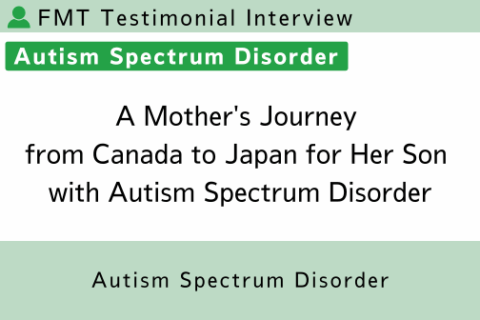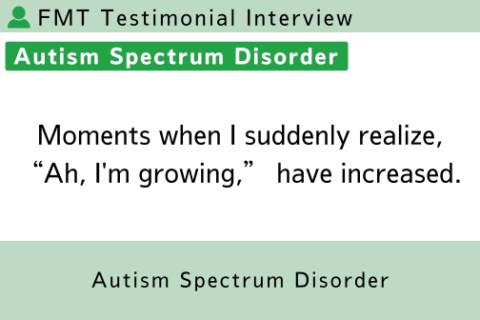Step I Step Nagoya Representative, Ms. Ikuko Kojima
Ikuko Kojima founded iStep Nagoya, a community for parents raising children with disabilities, based on her own experiences of lack of understanding of disabilities, prejudice, and being passed around by the world. The community provides parents with a place to connect offline and online, and an environment where they can build a future together. We spoke with Ms. Kojima, a community representative and parent of a transplant-challenged child, at an academic conference.

–I understand that your son is cooperating in clinical research.
Yes, I finished my transplant in July 2023 and am in communication with the doctor for the clinical study report in January 2024. my 10 year old son has autism spectrum disorder with severe intellectual disabilities. He has had severe constipation since he was a baby and has always had to use medication to pass stools. He has been throwing tantrums when he has stools in his stomach, which is partly due to his autism spectrum disorder. When I asked parents in the same situation, many of them were troubled by stools, so I thought in my layman’s way that there might be a relationship between autistic spectrum disorder and stools. That is why when I heard from my colleagues at i-step about the Intestinal Flora Transplant Clinical Study Group and that they were looking for people to cooperate in clinical research at the study group, I did not hesitate to apply.
–Please tell us about your son’s condition prior to receiving the transplant.
Other than constipation, he is a very picky eater. We would like to provide dietary therapy, but he will not put food in his mouth due to his “obsession” from his imaginary idiosyncrasies, such as “I can’t eat foods/cookings that I have never seen before. In this sense, I believe that intestinal flora transplantation, in which bacterial fluid is introduced through the hips, is the best treatment. As for language, he could imitate and parrot back, but interaction was difficult, and he could only produce a few words, such as “poop”.
Stools are finally pooped out with the help of medication. When I went into the clinical study, I had to stop the medication, so I was a little anxious about that.

–When did you learn about the intestinal flora transplant itself?
When my son was 2 or 3 years old, he had a particularly bad case of constipation that really bothered me. While searching the Internet for a solution, I found a stool transplant. In the days when the term “intestinal flora transplant” was still unheard of, the fecal transplant seemed to me to be a revolutionary method. My son is a picky eater, so it was difficult to get him to take his medicine by mouth. The method of inserting the drugs through the buttocks seemed truly revolutionary. At the time, however, I did not have the courage to travel all the way from Nagoya to Osaka, even to receive the transplant.
However, I had no hesitation in applying for this clinical research because I had such prior knowledge.
–Did you notice any changes in your son after the transplant?
First, there was a change in the stool. Not immediately after transplantation, but the colocolorized poop started to become moist stools. Although the stools are not stable, with some stools being columbites and others being banana-shaped, he now always has a bowel movement, even if it is a small one every day. When he has a bowel movement, he feels refreshed and is in a good mood.
There was also a change in his language. During the period he was undergoing transplantation, he took the Shinkansen bullet train between Nagoya and Shin-Osaka every week, and he seemed to enjoy the trip. She began to communicate what she wanted, such as packing her bags and uttering “Shinkansen” (bullet train). When she soiled her underwear, she once said “brown poo” and called my husband. Unfortunately, I was away for work, but until now, there have been no cases where he has said “poop” but with an adjective, including “brown”. With just one word, I know what my son is asking for. It speeds up the process of understanding him. The change in language has helped our family communicate much more smoothly.

–Expectations for the Intestinal Flora Transplant Clinical Study Group and your own future prospects.
I really appreciate the fact that the Intestinal Flora Transplant Clinical Study Group is focusing its research on autism spectrum disorder. There are many parents suffering from disabilities, not limited to autistic spectrum disorder. Until now, the general approach has been to correct the behavior of children with disabilities based on the belief that disabilities cannot be cured. We believe that the appearance of intestinal flora transplantation as a “treatment method” is a very big step forward in this situation. There must be a certain number of parents who would like to know more details about the experience. We would like to help such parents make a choice by sharing our son’s case.
The 7th Annual Conference [Report] is here.
Related Videos
Guest participation by Mr. Kojima [14th Roundtable Discussion with Loose Fungi].

















